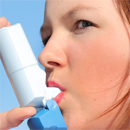 A link has been uncovered between farm dust bacteria and its ability to protect people from asthma and allergies. The findings were discovered by researchers at VIB (a life science institute in Belgium) and Ghent University.
A link has been uncovered between farm dust bacteria and its ability to protect people from asthma and allergies. The findings were discovered by researchers at VIB (a life science institute in Belgium) and Ghent University.
Previous research on children who consumed raw cow’s milk revealed it could protect them against allergies and asthma. Those previous findings are what prompted researchers to conduct their current research. Professor Bart Lambrecht from the university said, “At this point, we have revealed an actual link between farm dust and protection against asthma and allergies. We did this by exposing mice to farm dust extract from Germany and Switzerland. These tests revealed that the mice were fully protected against house dust mite allergy, the most common cause for allergies in humans.”
Advertisement
But why are farm dust bacteria useful in protecting individuals from asthma and allergies? Well, it is because farm dust creates mucus membranes inside the respiratory tract to react less to severe allergens such as house dust mites. Professor Hamida Hammad added, “This effect is created by the A20 protein, which the body produces upon contact with farm dust. When we inactivate the A20 protein in the mucous membrane of the lungs, farm dust is no longer able to reduce an allergic or asthmatic reaction.”
Their findings were tested on humans which revealed those who suffered from allergies were also low in A20 protein. Researchers also examined 2,000 children raised on farms and found the majority of the children were protected from asthma and allergies. Those children who did develop allergies had a mutation of the protein A20 which led it to malfunction and not be protective.
Researchers are now attempting to uncover the protective property in farm dust bacteria as a means to prevent asthma in the future.
Common symptoms of asthma
 Asthma is a respiratory condition which affects breathing. It occurs when the airway passages narrow and swell thus creating excess mucus. Breathing becomes impaired and it can lead to coughing, wheezing and shortness of breath.
Asthma is a respiratory condition which affects breathing. It occurs when the airway passages narrow and swell thus creating excess mucus. Breathing becomes impaired and it can lead to coughing, wheezing and shortness of breath.
Symptoms of asthma include:
- Shortness of breath
- Coughing
- Wheezing
- Tightness or pain in chest
- Difficulty breathing
- Whistling sound when inhaling or exhaling
Causes and risk factors of asthma
Advertisement
Not everyone will develop asthma in their lifetime and doctors are still unsure why some people develop it and others do not. It is believed that genetic and environmental factors could play a  role in the onset of asthma. What we do know are common triggers to induce asthma symptoms which include:
role in the onset of asthma. What we do know are common triggers to induce asthma symptoms which include:
- Airborne allergens
- Respiratory infections
- Physical activity – exercise induced asthma
- Cold air
- Air pollutants, smoke
- Certain medications
- Strong emotions and stress
- Sulfites and preservatives found in food
- Gastroesophageal reflux disease (GERD)
- Menstrual cycle in women
Although an exact cause of asthma is unknown there are some factors which can increase a person’s risk of developing asthma or experiencing symptoms of asthma. They are:
- Having a blood relative have asthma
- Having another allergic condition
- Being overweight
- Being a smoker
- Exposure to secondhand smoke
- Having a mother who smoked while pregnant
- Exposure to pollutants
- Exposure to occupational triggers – chemicals, hairdressing, etc.
Tips to prevent asthma
Because there isn’t an exact cause of asthma there isn’t a sure-fire way to prevent it. What you can do though, is prevent severe asthma attacks and better manage your asthma so it doesn’t begin to affect daily life. Here are some tips to better handle and prevent asthma.
- Follow your asthma plan: If your doctor has provided you with inhalers and other medications ensure you are taking these as prescribed.
- Get vaccinated: Vaccinations for the flu and pneumonia are important when you have asthma because these conditions can make your asthma much worse.
- Identify asthma triggers: Get an allergen test to become aware of some triggers of asthma and take steps to avoid such triggers.
- Monitor breathing: Over time you may recognize the onset of an asthma attack (wheezing, cough, tightness in chest). You can check your breathing with an at-home peak flow meter to make sure you are keeping track of your breathing to prevent an attack.
- Monitor quick-inhaler use: If you continuously use a quick-relief inhaler then your asthma is not well managed. Your treatment may need to be changed, so it’s important to speak with your doctor.
